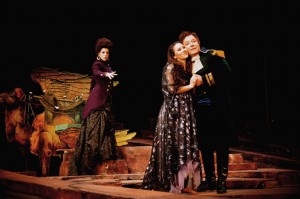UTAH OPERA, DIE ZAUBERFLÖTE, Capitol Theatre, March 16; additional performances 7:30 p.m. March 18, 20, 22, 2 p.m. March 24; tickets at 801-355-2787, 888-451-2787, www.utahopera.org (approximate running time 2 hours and 45 minutes with one intermission)
Today’s directors don’t know what to make of Mozart’s Die Zauberflöte because it can’t be categorized. There are so many different layers in the work they’re at a loss. Die Zauberflöte has elements of Italian opera and German Singspiel, and some of the vocal and orchestral writing borrows deliberately from the baroque. The work is also filled with Masonic symbolism and Eastern exoticism. And then there is the fantastical, fairy like element. All of which throws directors for a loop.
Thaddeus Strassberger’s concept and design, which Utah Opera has revived, focuses on the Eastern aspect: the Three Ladies are Hindu; the priests of Sarastro’s temple are Arabic; the Queen of the Night is Egyptian in Act II (in Act I she could have passed as the bride of Frankenstein with her funky hairdo); the Three Boys, with their creepy red and green costumes and make up, look as if they’re the illegitimate progeny of the tattooed Monostatos and the witch from Hänsel und Gretel. Tamino, on the other hand, is dressed as an 18th century military officer. However, the oddest character in this odd assortment is Sarastro. He is made up to look like the early 20th century Russian mystic Rasputin.
But opera is about the singing, and fortunately, Utah Opera has for the most part assembled a strong cast of singers.
Leading off the cast is local tenor Robert Breault as Tamino. Breault has the right kind of vocal timbre and lightness to take on the part. His singing on opening night was light, lyrical and beautifully crafted and phrased. His acting is also of the caliber to bring credibility to the role. His “Dies Bildnis ist bezaubernd schön” early in Act I was one of the highlights of the evening for the expressiveness and heartfelt emotions he brought to it.
As Pamina, Tamino’s love interest, soprano Anya Matanovic is breathtaking. She has the looks and demeanor to pull off the role of a young woman experiencing love for the first time, yet she also captured Pamina’s strength and courage in warding off Monostatos’ advances and her determination to lead Tamino through his trials. Her voice is crystalline and she brings nuanced subtleties to her singing.
Baritone Daniel Belcher is perfectly cast as the easy going bird catcher Papageno. Possessing a light and lyrical voice and with solid comic acting talents, he gave a stand out performance. His duet with Papagena (soprano Amy Owens) was sheer delight.
Also remarkable were the Three Ladies (sopranos Jennie Litster and Sishel Claverie and mezzo-soprano Jessica Bowers). All three have sparklingly lyrical voices and they sounded fabulous together.
The Three Boys, sung by Madeleine Choir School students Eric Stevens (replacing Jacob Tryon on opening night), Griffin Mozdy and Jonas Malinka-Thompson, were splendid. They sang their parts with a professionalism that put them on an equal footing with the adult singers. They were an absolute joy to hear.
The Utah Opera Chorus was once again in top form, bringing depth to their small part and singing with a rich, resonant sound.
On the down side are soprano Audrey Luna as the Queen of the Night and baritone Jeremy Galyon as Sarastro.
Luna was in fine form Saturday in her lower range, but in the virtuosic passages of her two arias she sounded forced in hitting the high Fs. For someone who has sung the role over a hundred times, she obviously wasn’t in command of her high register.
Galyon has a nice voice but couldn’t handle the low notes. Why Utah Opera didn’t hire a bass for the part is a mystery.
The Utah Symphony under conductor Timothy Long played well and Long’s tempos were for the most part well chosen.
The opera is sung in German with dialogue in English, which works quite well. However, many of the singers had problems with their German pronunciation. A little more work with a language coach would have been in order.

